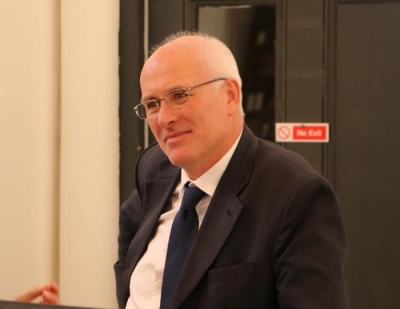ARTES 25 Years of Telecom: Interview with Nick Appleyard
As ESA’s umbrella programme for telecom, ARTES, celebrates its 25th year, we will be examining why it was set up, how it and the European satcom environment have evolved, the opportunities and challenges that both face today, and what the future holds.
This week we spoke to Nick Appleyard, Head of the Downstream Business Applications Department, who told us how his area supports Europe’s industry.
What achievements are you most proud of?
One of the most exciting recent developments has been establishing relationships with private investors, who are an increasingly important source of funds for growing companies in the space economy.
The first of these was a cooperation with space-specialist venture capital (VC) fund Seraphim Capital in London. We expect more VC funds to emerge across Europe over the course of the next year, with whom we are ready to forge similar connections.
We also work with seed and angel funds to help provide for companies just starting out, and for more mature companies, are cooperating with the London and Milan Stock Exchanges' ELITE programme, which supports businesses in the pre-IPO (initial public offering) stage.
This sets the stage for a new role for ESA, bringing together complementary public and private capital and the complementary technical and business expertise of ESA and investors, into a connected system of support for the exciting companies that define Space 4.0.
Can you tell us about the opportunities and challenges facing you currently?
In order to streamline ESA’s efforts to maintain and improve the capability and competitiveness of the industry, we are now in the process of assembling and integrating elements from several programme areas into a common structure. A single marketing and outreach effort through a new "Downstream Gateway" will allow ESA to find new entrants to the sector, and guide them towards the right support from amongst the rich variety of expertise and resources we offer.
We are bringing the ESA Business Incubation Centre (BIC) initiative together with private finance and an increasing range of business resources, so that we can support growing companies from their beginnings all the way through to scale-up in global markets.
We are also strengthening our support for product and service development in the Business Applications programme, to help companies cater to the ever-expanding range of commercial opportunities available to them, powered by ESA and the space industry itself.
We aim to further streamline our processes and enhance our communication, so that we can be seen as a friend and supporter for every business working with space. Such change is a challenge, and we have much left to do, but we have already made an exciting start.
What is your vision for your department?
Our vision centres on the impact that space has on Europe's economy and the everyday lives of European citizens. We are at a time of rapid, almost revolutionary change in the way that space activities are conducted. The structural investments made by governments over the past fifty years are now being complemented by an independent private industry, motivated by commercial opportunities from services and products for paying customers on the ground. Not to mention that there will soon be customers in space too! These companies generate jobs, revenues, exports, and they connect us to each another and the world around us through space assets.
The vision for ESA Business Applications Department is then to be the companion, supporter and guide for these businesses. We will introduce them to the accumulated space economy’s expertise and resources, and share the celebration as their success is realised and their impact is felt.
What is the most interesting innovation you've seen come from your activities?
It is hard to pick a single example among the hundreds of companies whose ideas we have had the privilege to support. We see new marvels every week, as inventive minds see the opportunity to use space across the entire economy. There seems to be no limit to the innovation that is finding its way into sectors ranging from banking to education to trucking! These entrepreneurs’ energy and vision is continuously energising.
But, if pressed, we could single out "Fisherman Frank", who showed us how satellite communication at sea can cut the paperwork of landing a catch, ensuring that our fish is fresher and its quality guaranteed. Frank also reminded us that you cannot just install satcom equipment on a fishing boat by drilling holes all over it – that is somebody's home!
Or we could look at Blue Skies Space, who convinced us of the possibility for space astronomy as a service, based on a privately funded satellite. This is not only a new business opportunity, but also a reminder of how few areas of the space sector will be immune from the new entrepreneurial spirit.
And if I, or my loved ones, are ever unfortunate enough to require ambulance assistance, then I hope it will be equipped with a Tempus monitor, relaying our life signs through to the medical consultants at our destination.
There are so many ideas, which affect us in so many ways, and I cannot wait to see what will come next.


